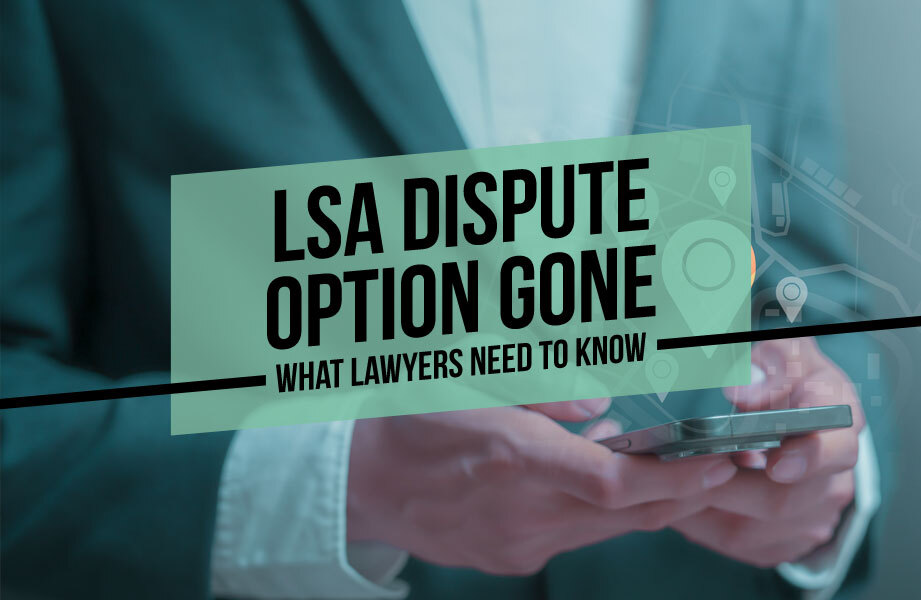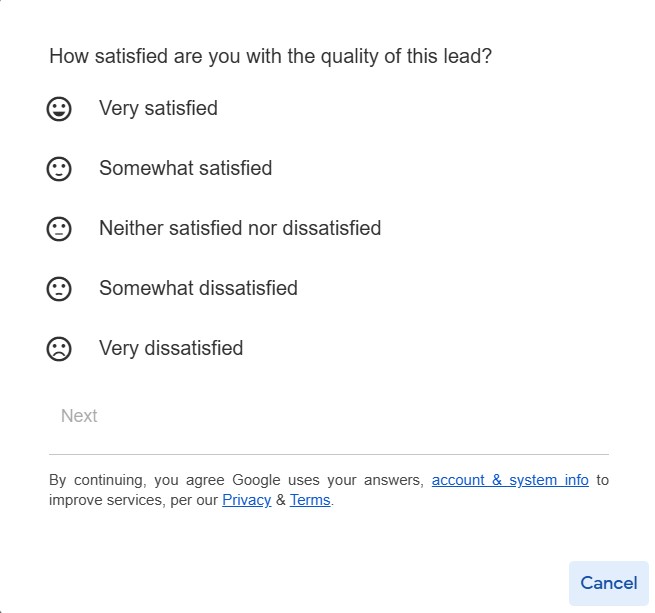
As of July 2024, Google has made significant changes to the Local Service Ads (LSA) platform, specifically for the dispute process. The manual dispute option, which allowed lawyers and business owners to challenge the validity of leads or ratings, has been removed. This change has left many lawyers wondering what this means for their LSA campaigns and how they can protect themselves from unfair leads or ratings.
What are Local Service Ads?
In case you are new to all of this, Local Service Ads (LSAs) are a form of advertising offered by Google that specifically targets local businesses. They are designed to connect potential customers with local service providers, such as lawyers. LSAs appear at the top of Google search results and include information about the business, such as its name, address, phone number, and star rating.

How Did the Dispute Process Work Before?
In the past, lawyers could dispute the validity of leads or ratings through a manual process. This process involved submitting a request to Google, which would then investigate the claim. If Google determined that the lead or rating was invalid, it would be removed from the lawyer’s profile. In most cases, this was successful and would result in a credit to the account.
How Does the Rating System Work Now?

Under the new system, while lawyers and business owners can no longer formally dispute leads, they do have some level of influence through a lead rating system. After a lead is generated through Local Service Ads, Google AI will review it and determine its validity. You’ll then be prompted to rate the lead’s quality.
If you provide a negative rating, in some cases, you may receive an immediate credit for that lead, though this doesn’t seem to happen often. Most times, Google might simply thank you for the feedback. This new approach serves as a subtle way to potentially dispute the validity of a lead, although it’s not always successful in securing a credit. It’s also highly likely that this feedback loop is being used to train Google’s AI to further refine its lead validation algorithm.
Is Google AI Overview Good for Law Firms?
Is This LSA Change a Good or a Bad Thing?
The removal of the manual dispute option has sparked a spectrum of opinions within the SEO/SEM community. Some see it as a positive shift, believing that Google’s AI-powered lead validation system will filter out unqualified or irrelevant leads, resulting in a higher-quality pool of potential clients, while also providing a reduction in the amount of management required for a successful LSA campaign.
However, many express concerns about the loss of direct control. The inability to manually dispute leads raises worries about being unfairly charged for poor leads, even in cases where the lead itself was inaccurate or generated by a misclick. Instead of saving work, at least in the short term, the lack of a dispute option will increase the work needed. If your campaign was a little broad before, you always had the option to dispute, but now your LSA campaign needs to be laser-focused on getting the best leads, and that demands an increase in monitoring and management, not a decrease.
With this new system, we’re hoping that Google can further enhance its lead-matching capabilities, delivering even more targeted and relevant leads to law firms. However, the long-term implications of this shift are still unfolding. In these early days, caution is advised.
Experienced marketers are closely monitoring LSA accounts, tracking lead quality, and analyzing the impact of the automated rating system on overall campaign performance. Only time will tell if this AI-driven approach truly translates to better, more qualified leads for law firms.
Read More: Civille’s Law Firm Lead Enhancement
Why Did Google Remove the Dispute System?
Google has not officially stated why it removed the manual dispute option. However, it is likely that they believe the new automated system is more fair and efficient. It is safe to say that the dispute system is dead though. We can only expect the use of AI in search engine marketing to increase in the future.
What Should Lawyers be Doing Differently With LSAs?
It’s always been crucial to monitor your LSA campaigns closely and to track your leads and ratings. But now, the need for monitoring is greater than ever. With the removal of manual lead disputes, your ability to control the quality of leads directly has diminished.
This shift places even more emphasis on proactive campaign management and optimization. Fine-tune your LSA campaign to align precisely with your target audience. This includes refining your service areas, and even adjusting your business hours if you notice a pattern of irrelevant leads during specific times or leads that you are simply missing.
Taking swift action when you notice a dip in lead quality is essential. Beyond simply rating leads negatively, be proactive in making campaign adjustments. If you’re receiving leads outside your desired practice areas, refine your job types and keywords to attract more relevant inquiries. If leads are coming from local areas you don’t service or where lead quality always seems to be low, adjust your service area accordingly.
Remember, your LSA campaign is not a static entity. It requires ongoing attention and refinement, especially in this new AI-driven landscape. By closely monitoring your leads, responding to feedback, and making data-driven adjustments, you can increase the likelihood of attracting high-quality leads and maximizing your ROI from LSAs.
2024 Beginner’s Guide to Law Firm SEO
How Can Civille Help?
At Civille, we understand that the changes to the LSA platform can be confusing and frustrating for lawyers. We are here to help you navigate the new system and to ensure that you are getting the most out of your LSA campaigns. We can mange your LSA campaign for you, monitor and rate leads, adjust job types, bidding strategy, etc. and more! If you are a lawyer who is concerned about the changes to the LSA platform, please contact Civille today to learn more about how we can help you.You can schedule a quick 15-minute meeting here.





